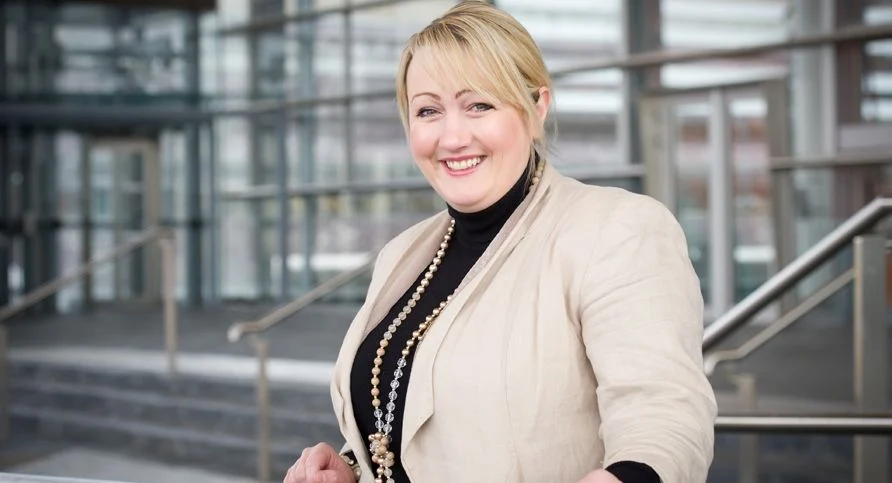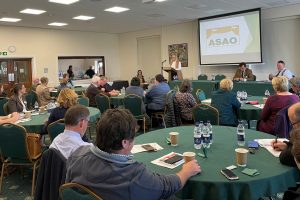 REBECCA EVANS AM, Assembly Member for Mid and West Wales, has led a debate at the National Assembly for Wales on the safety of children online.
REBECCA EVANS AM, Assembly Member for Mid and West Wales, has led a debate at the National Assembly for Wales on the safety of children online.
Mrs Evans brought forward the debate at the Senedd to explore the dangers facing children online following a series of tragic and high profile cases tied to internet use, and the publication of several pieces of research highlighting the challenges facing children online.
Mrs Evans told the Assembly that although the role of internet service providers, search engines and social networks in protecting children lay beyond the scope of the Assembly, “to shrug our shoulders and say that the challenges are too big, or that it is just not our job would absolve us from our responsibility to use every opportunity that we do have in Wales to equip children, parents, teachers, youth workers and so on with resilience, knowledge and support, so that they are best able to deal with the challenges faced by children online day in, day out.”
Mrs Evans explored peer-to-peer issues such as bullying and exploitation, as well as stranger dangers including online grooming, and easy access to explicit adult material which may be extreme or violent in its content.
Mrs Evans said: “Most children now have a phone with internet access and nine out of 10 of them say that there are no parental restrictions on its use. For most children, their virtual lives are synonymous with their real lives, and what happens online affects them offline.”
Tackling cyberbullying
After the recent publication of a Funky Dragon survey which found that over a third of 11 to 17-year-olds in Wales who had been bullied had suffered from cyberbullying, Mrs Evans asked the Welsh Government how it was addressing the unique challenges posed by bullying online.
Mrs Evans said: “Online bullying is relentless; it is 24/7 and it follows bullied children everywhere that they go. They carry it around on the phone in their pocket.”
The Children’s Commissioner for Wales Keith Towler has also echoed these concerns. Responding to the debate, the Deputy Minister announced that “As part of the 2013 Anti–bullying Week, from 18 to 22 November, the Welsh Government will be launching a campaign to raise awareness of cyberbullying and to highlight where to go for help.”
A force for good too
Mrs Evans ended her contribution by being clear that she “did not want to give the impression that cyberspace is a wholly dangerous and nightmarish place to be avoided at all costs.”
“In fact,” she said, “it is quite the opposite. Access to the internet can be incredibly enriching. Children can talk to other children thousands of miles away and develop global citizenship and a sense of responsibility to other people on the other side of the planet. They can have fun and stay in touch with friends, and it is a wonderful learning environment and research tool, a gateway to almost limitless knowledge, and a forum to develop skills and ideas.
“By educating children and those who protect and support them about the safe use of the internet, including recognising danger and the importance of privacy settings and content blocks, for example, we can make the internet a much safer place for them. By helping children to put what they see and experience online into context offline we can build their resilience. There is a huge amount of very good work already taking place in Wales by parents, schools, the third sector, police and others, and I would ask the Government to explore how we could bring all of this good practice together to make the internet a safer place for children.”
Mrs Evans looks forward to meeting with the Deputy Minister in order to further discuss actions to ensure the safety of children online.
Let’s talk about sexts
Modern trends such as sexting – the act of sending sexually explicit messages, photographs, or video content, primarily between mobile phones – are causing children’s charities in Wales concern.
Speaking in the debate, Mrs Evans said: “NSPCC Cymru and ChildLine have warned that many children are frequently taking big risks when making and sending sexual texts, photos and videos of themselves. They found that sexting is considered a normal, everyday activity among young people as young as 13 years old, with around a quarter of them having made photographs or videos to send on to others. Barnardo’s Cymru has also identified what it calls peer-based exploitation as an increasing trend.”
Mrs Evans warned that once the image has been sent on, it is out of the young person’s control and told the Assembly that the Internet Watch Foundation has reported that images are regularly shared around school, uploaded to social networks and sometimes find their way on to paedophile websites. In just 40 hours, an IWF analyst found more than 12,000 images of teens that were originally sent as texts on 70 paedophile websites.
Mrs Evans said that after seeing calls about sexting rise by 28% last year, ChildLine has developed a “fantastic app” called Zipit, which provides witty and safe comebacks that children and young people can use to reply when faced with requests for explicit photos. She asked the Deputy Minister for Skills, Ken Skates AM, to consider how the Welsh Government could promote the app and similar resources.
Responding to the debate, the Deputy Minister asked Mrs Evans to meet with him and his officials to discuss in further detail how sexting can best be addressed.
Parents have a big role to play
Mrs Evans told the Assembly that parents were “probably the most important defence that children have against the darkest elements of the internet,” but added that they sometimes needed support to be able to fulfil that role.
She referred to research by web safety organisation Knowthenet which suggested that some parents may be failing to protect their children in cyberspace, simply because they do not understand the net speak that peppers online exchanges.
Mrs Evans said: “For many parents, their understanding of everyday slang starts and ends with ‘LOL’, but they can be sure that their children’s vocabulary is much wider. A Knowthenet survey of 1,000 parents found that the least understood term was ‘LMIRL’, which means ‘Let’s meet in real life’. Also among the least-known acronyms were ‘ASL’, which means age, sex, location and ‘POS’, parents over shoulder.”


















Add Comment